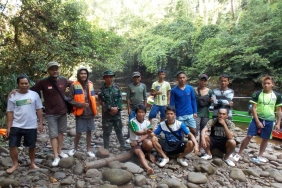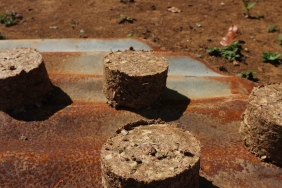MAHOUT, THE ELEPHANT'S PARTNER IN THE ELEPHANT PATROL TEAM ELEPHANT FLYING SQUAD
By: Natalia Trita Agnika
"We used to hear a lot of birds or other animals in the patrol area. Now we hear the sound of chainsaws," said Erwin Daulay one afternoon, complaining that the Tesso Nilo National Park had been encroached upon by illegal loggers. The man, who has been a mahout since 1990, is one of 10 elephant handlers assigned to Tesso Nilo National Park.
Along with other mahouts, Erwin is in charge of caring, nurturing, training and patrolling with trained elephants in the Elephant Patrol Team or Elephant Flying Squad. The team, introduced by WWF-Indonesia and the Tesso Nilo National Park Center in 2004, is tasked with driving wild elephants that enter people's gardens back to their habitat in Tesso Nilo National Park so as to reduce conflict between elephants and humans.
The ten mahouts assigned to Tesso Nilo National Park are Ruswanto, Erwin Daulay, Fikri Pohan, Junjung Daulay, Adrianto, Tengku Asril, Sari Tua, Herianto, Rozi Nurbit, and Bagus Prayudi.
To become a mahout, they must undergo special training and cannot directly handle elephants. Previously, there is a stage of approach and recognition of the sound or type of elephant. In addition, they also receive technical training related to the patrol tasks they will perform. "(We were trained in) driving wild elephants, making carbide cannons, and distinguishing the behavior of female and male elephants," said Rozi Nurbit, a mahout who was once stung by a wasp while on duty in the forest.
The close relationship and strong emotional connection between mahout and the elephants in his care can make patrol duties run smoothly. The Elephant Flying Squad team regularly, twice a week, patrols the areas bordering Tesso Nilo National Park. While on patrol, mahout and his elephant will identify signs of wild elephants so that eviction efforts can be made early. Not only that, Tengku Asril explained that during patrols, mahout also monitors the presence of illegal logging and hotspots. When they encounter other animals, such as tapirs, deer, etc., they will record it.
Being on duty with the Elephant Patrol Team gives pride to the mahouts. "When the team succeeds in carrying out the task well, the hard work makes pride and enthusiasm for the next tasks to save elephants from conflicts between humans and elephants. This noble task of protecting endangered animals certainly makes the team continue to do their best to protect elephants and other animals," Bagus Prayudi said proudly.
Moreover, the tasks they perform are not easy. There are times when their lives are threatened when dealing with wild elephants to be herded. An unforgettable experience was experienced by Adrianto. The man, who has been a mahout since 2008, was rescued by an elephant he had been taking care of since he first became a mahout. "I am very grateful to Ria the elephant who saved my life by presenting her body to save me from a wild elephant attack," he recalls. Adrianto is now a mahout for Tesso, Ria's elephant calf.
A herd of wild elephants also destroyed the camp of mahout 2001. Fikri Pohan said that when camp was empty, a herd of wild elephants passed by and destroyed camp. All the food supplies were eaten by the wild elephants. "We only had clothes on our bodies," explained the father of one.
But the love for these charismatic animals keeps the mahouts eager to carry out their duties. Even Herianto admitted that he has had a love for elephants since he was in elementary school. They care about the fate of Sumatran elephants. "Elephants are also God's creation that must be protected and preserved," said Rozi Nurbit. Tengku Asril, who claims to work from the heart, feels that the job of a mahout is a noble task, especially since he has often met wild elephants since childhood when his father was a farmer.
The elephant partners in the Elephant Patrol Team are people who know very well the conditions in the natural habitat of Sumatran elephants. They have the same hope that all parties will protect the natural habitat of Sumatran elephants. "Hopefully the government and the community can work together to preserve and protect the Sumatran elephant," Adrianto hoped. Therefore, firm action needs to be taken. Parties that handle and crack down on illegal logging and forest encroachment must be more assertive so that forests are no longer eroded. Do not let Tesso Nilo National Park, Sumatran Elephants, and the wildlife that live in it only become a fairy tale in the years to come.





